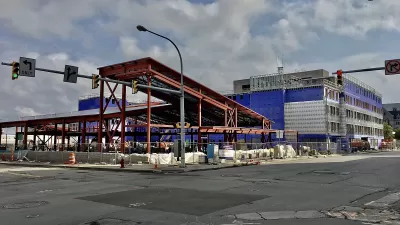Washington D.C. recently revised bike parking requirements for new or rehabilitated residential buildings, building on precedents first set in 2007.
"On November 28th, DDOT adopted changes to bicycle parking rules at residential buildings," reports the Wash Cycle bike advocacy blog.
"Thanks to the update, all new or rehabilitated residential buildings of 8 units or more are now required to provide 1 bicycle parking space for every 3 units," according to the post. More details about the nature of parking required: "Parking should, for example, be indoors; but if not possible, then be in a secure, covered area adjacent to the building. The rules define how much space there needs to be, the clearance, lighting, accessibility, signage, etc..."
The new requirement update a legislative history that goes back to 2007, when the first of such requirements were considered.
FULL STORY: Residential buildings now required to provide bike parking

Planetizen Federal Action Tracker
A weekly monitor of how Trump’s orders and actions are impacting planners and planning in America.

San Francisco's School District Spent $105M To Build Affordable Housing for Teachers — And That's Just the Beginning
SFUSD joins a growing list of school districts using their land holdings to address housing affordability challenges faced by their own employees.

The Tiny, Adorable $7,000 Car Turning Japan Onto EVs
The single seat Mibot charges from a regular plug as quickly as an iPad, and is about half the price of an average EV.

With Protected Lanes, 460% More People Commute by Bike
For those needing more ammo, more data proving what we already knew is here.

In More Metros Than You’d Think, Suburbs are Now More Expensive Than the City
If you're moving to the burbs to save on square footage, data shows you should think again.

The States Losing Rural Delivery Rooms at an Alarming Pace
In some states, as few as 9% of rural hospitals still deliver babies. As a result, rising pre-term births, no adequate pre-term care and "harrowing" close calls are a growing reality.
Urban Design for Planners 1: Software Tools
This six-course series explores essential urban design concepts using open source software and equips planners with the tools they need to participate fully in the urban design process.
Planning for Universal Design
Learn the tools for implementing Universal Design in planning regulations.
Smith Gee Studio
City of Charlotte
City of Camden Redevelopment Agency
City of Astoria
Transportation Research & Education Center (TREC) at Portland State University
US High Speed Rail Association
City of Camden Redevelopment Agency
Municipality of Princeton (NJ)




























